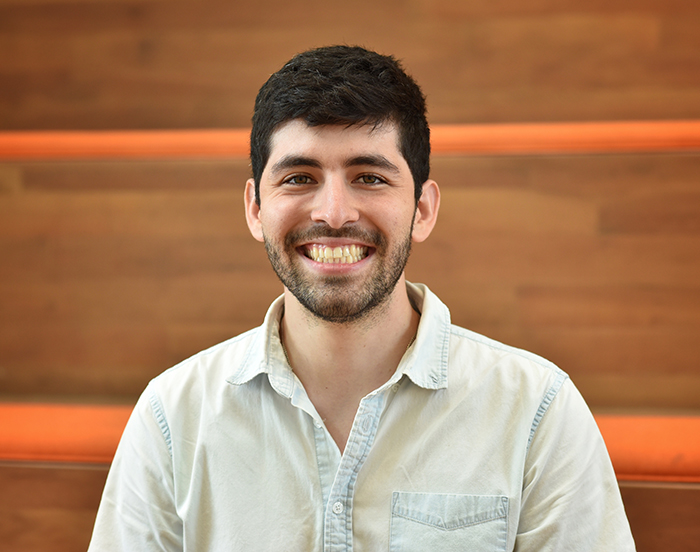A Global Health Mission

2019 grad focuses on health challenges in world's underserved communities
by MaryAlice Bitts-Jackson
Liam Alec Stenson Ortiz ’19 has come a long way from the struggles of his early life and his first days as a Dickinson student. His work with a world-renowned institute puts him on track to help the underserved on a global scale.
Challenging road
Ortiz grew up in Mexico, a child of divorce whose mother battled addiction. He was only 13 when he took himself and his younger brother out of that difficult situation to live with their American father in Santiago de Querétaro—a bold step he later recalled as “the hardest and bravest thing I’ve ever done.” It was an uphill battle—Ortiz was behind on his studies and worked hard to catch up. After moving to Irving, Texas, Ortiz graduated from high school and earned a scholarship to Dickinson.
On campus, Ortiz learned Portuguese—his fourth language, after Spanish, French and English—declared a major in biochemistry & molecular biology and pursued a health studies certificate. His dream was to care for underserved populations, perhaps as a general practitioner. But an introductory course in global health provided a new way to look at science, health, society and policy and opened his eyes to the possibility of improving health on a global scale.
The first step after graduation: working at the Broad Institute of Harvard and MIT on a healthcare challenge that was roiling the world.
“It was a powerful feeling, knowing I was doing what I could to help."
Fighting COVID
Ortiz began at the Broad Institute in August 2020, the most severe point of the COVID-19 pandemic. As a frontline worker on COVID diagnostics, he processed swabs and developed testing processes, working 12 hours on the night shift for two years.
The institute processed up to 150,000 tests a day during that time. The resulting data were used by hospitals, universities and government and policy entities around the world to make vital public-health decisions throughout the crisis.
“It was monotonous, and the hours were long, but I also knew it was vitally important work,” says Ortiz. “It was a powerful feeling, knowing I was doing what I could to help a worldwide issue.”
Readying for tomorrow’s challenges
“It’s a really incredible experience ... [and] it's only possible because of our mutual relationships and trust.”
Now in a research role at the institute’s Sabeti Lab, Ortiz helps develop and implement diagnostic methods to surveil strains of pandemic-potential pathogens, focusing on specific diseases such as Ebola and Lassa fever. The technology is used to detect and identify the presence of various strains of these diseases so scientists, leaders and policymakers can make informed decisions about treatment and public health.
Ortiz also collaborates with scientists in low-income countries to prepare for upcoming health challenges. As part of a Broad Institute team, he traveled to Nigeria last December and to Sierra Leone last May.
While abroad, Ortiz works on disease-surveillance equipment, provided through funding from the institute, the African Centre of Excellence for Genomics of Infectious Diseases and other international organizations. He validates equipment and protocols already in use, ensures that proper clean-room procedures are in place and troubleshoots as needed. And, since the reagents and consumables used to run diagnostic tests are difficult to acquire in low-income economies, the Broad team procures and replenishes those supplies.
Some sites have more resources than others, so flexibility and creativity are essential. The work also requires finely honed collaborative skills and intercultural understanding, as well as technical proficiency, problem-solving and analysis.
“We don’t just drop off the resources and leave—we are there to accompany them in their scientific journeys, just as they accompany us in ours,” stresses Ortiz. “It’s only possible because of our mutual relationships and trust with people who join us on our scientific efforts. It’s a really incredible experience to do this work with them.”
Resilience and truth
“I love that I’m able to bring science—which is all about seeking the truth—and scientific discoveries to help people."
Like Ortiz, the international scientists he partners with have traveled rocky roads to success. Some persevere for more than a decade to earn doctoral degrees, weathering multiple derailments caused by limited funding and unexpected life events.
Recalling providers, community health workers and scientists he met at Kenema Government Hospital of Sierra Leone, an epicenter of the 2014 Ebola outbreak, Ortiz speaks with awe about the courage and emotional resilience it took to successfully stand at the forefront of that disease without the resources and infrastructure available to wealthier nations.
“It’s astounding to learn from the challenges they faced and the things they saw and endured,” Ortiz says. “But they’re still there, dedicated to their community in the same hospital. Their research and cooperation are fundamental for pandemic surveillance and the future of how we think about global health. It’s humbling and moving to meet and work with them on this very important work.”
Though different from the general practitioner role he originally anticipated, Ortiz’s work is infused with the mission that drew him to the natural sciences.
“It really is all about increasing accessibility—that’s something I have always been interested in,” he says. “I love that I’m able to bring science—which is all about seeking the truth—and scientific discoveries to help people, and I’m passionate about bringing those discoveries to communities that are essential to our research and are also underserved.”
Watch Ortiz's 2019 Remarks on the Power of Scholarship Support
TAKE THE NEXT STEPS
Published September 22, 2023